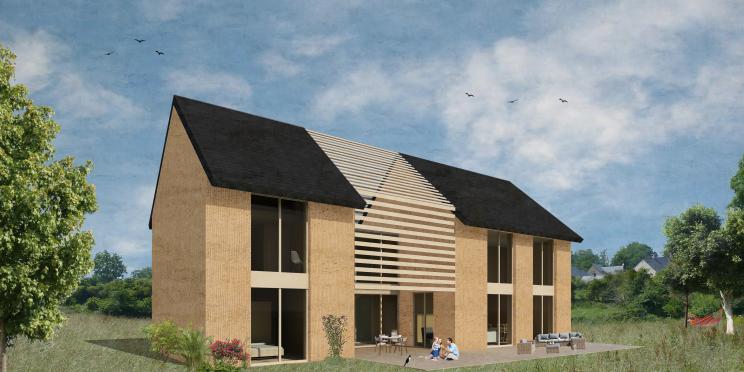CobBauge reaches crucial phase in developing its cob house prototypes
08/02/2022

With the construction of two low-carbon houses in the UK and France edging closer to completion, CobBauge builds its case for a new low energy construction material for houses.
The two prototype houses, located at the University of Plymouth (Devon, UK) and the Parc naturel régional des Marais du Cotentin and Bessin (Normandy, France), are expected to be completed in Spring 2022, with their walls and roof along with the windows and doors already in place.
This construction process is part of the second phase of CobBauge, a €4.1 million Interreg France (Channel) England project aiming to develop the use of cob in both France and the UK.
The project aims to use the performance measurements and learnings from the building process to prove the commercial viability of the project’s newly designed cob material, made from a combination of soil, clay and straw. Cob is a low-carbon alternative to traditional construction materials as it is produced from local soils. It has been widely used in the South of England and North of France for hundreds of years, with some houses in both countries dating back to the 1400s.
The development of a low carbon material for housebuilding is significant and timely given climate goals. Of all the CO2 emissions in the UK, 40% are associated with building; and 8% of global emissions come from cement.
However, one of the challenges addressed by CobBauge is to move cob into the 21st century as the material needs to meet both French and UK building regulations.
During the first stage of the project, researchers from the University of Plymouth and ESITC Caen established two different cob mixes with structural and insulation properties respectively.
In order to match construction industry standards, 600mm-thick walls have been designed, combining a 300mm-thick structural layer with a 300mm-thick insulating one. It has taken years of research to get to this point, with the team experimenting with six French soil types and six British ones, as well as with six different types of fibre.
Following tests assessing the load-bearing capacity of the walls, the construction of the single-storey prototype houses started in 2020 for the French site with its UK counterpart following suit a year later. The construction process of the pilot building at the University of Plymouth – which will host a teaching and meeting space of the Sustainable Earth Institute – can be watched in real time here.
Stakes are high during this phase as CobBauge relies on performance and usage data to make a strong case for the construction of cob houses in the Channel area. During the installation of the walls, a particular focus was placed on the drying time of the successive layers.
During construction and once the buildings are complete, the walls will be monitored for moisture and temperature and the air quality inside the two houses will also be evaluated. These measurements will then be compared to data from traditional building materials.
CobBauge is led by the University of Plymouth and involves five other project partners across the Channel: ESITC Caen, Regional Nature Park of the Marshes of Cotentin and Bessin, Earth Building UK and Ireland, University of Caen Normandy and Hudson Architects.
CobBauge aims to train over 500 builders and other professionals in cob construction methods by the end of the project in June 2023. It is hoped that this will then lead to the construction of 1500 ‘CobBauge’ buildings within ten years.
More information:
